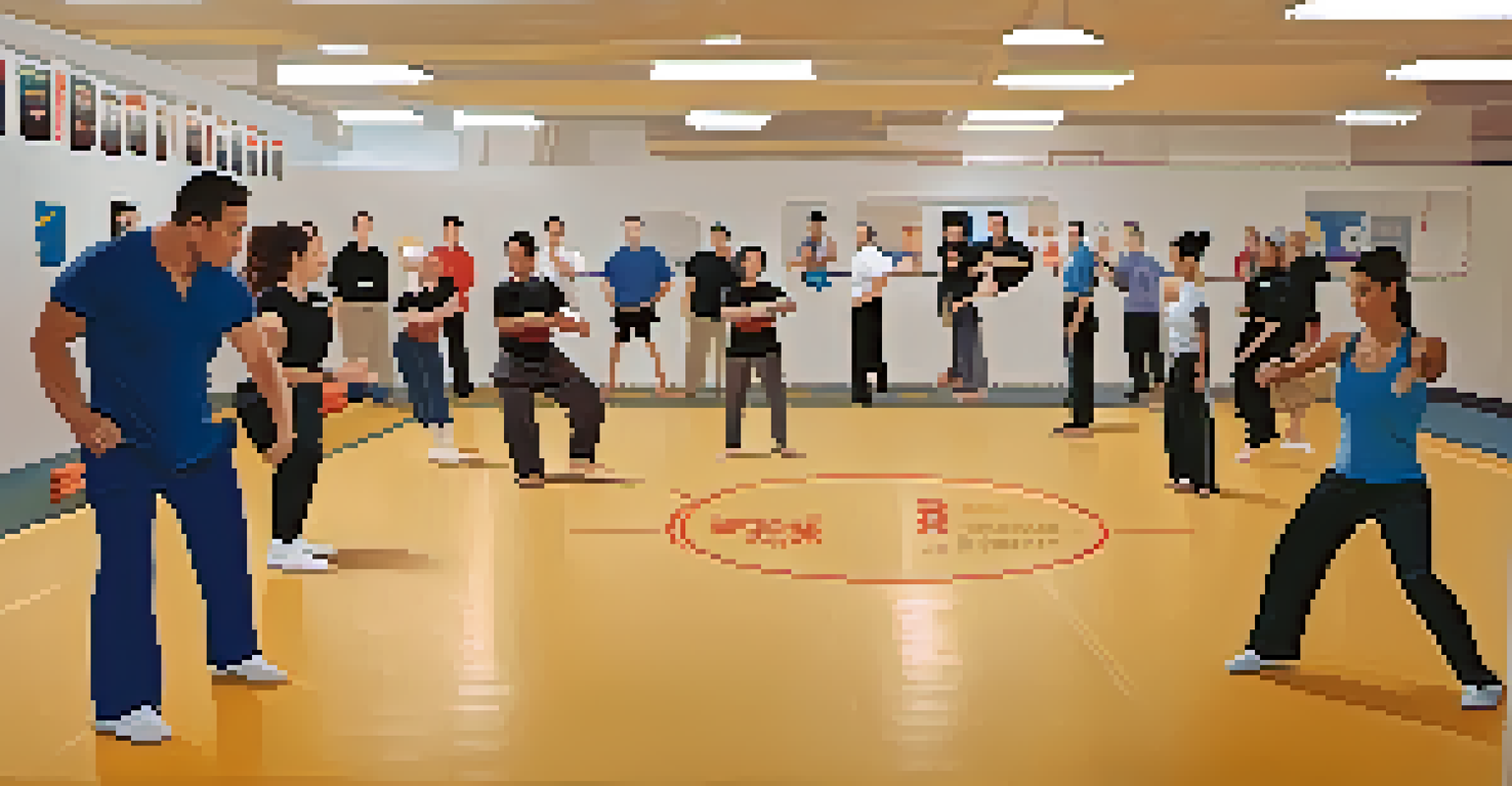Understanding Self Defense: Techniques for Real-Life Situations

The Importance of Self Defense in Daily Life
Self-defense is not just about fighting; it's about feeling empowered and safe in your everyday environment. Whether walking to your car at night or jogging in a park, being aware and prepared can significantly enhance your sense of security. Understanding self-defense techniques equips you with the tools to respond effectively in potentially dangerous situations.
The best defense is a good offense.
Moreover, self-defense training can boost your confidence. It helps you recognize your own strength and teaches you to trust your instincts. This newfound confidence can deter potential threats, as many attackers seek out vulnerable individuals.
Ultimately, learning self-defense is about taking control of your safety. It fosters a proactive mindset, allowing you to navigate the world with assurance. Remember, the best self-defense strategy often begins with awareness and prevention.
Basic Principles of Self Defense
At the core of self-defense is understanding the basic principles: awareness, avoidance, and action. Awareness involves recognizing your surroundings and identifying potential risks before they escalate. This could be as simple as noticing someone following you or being alert in unfamiliar environments.

Avoidance is the next step, which means steering clear of dangerous situations whenever possible. For instance, if you feel uncomfortable in a particular area, it's wise to change your route or seek a more populated place. This principle emphasizes that sometimes, the best defense is simply not being there.
Empowerment Through Self Defense
Learning self-defense techniques enhances your confidence and sense of safety in everyday situations.
Finally, if a confrontation is unavoidable, knowing how to take action is crucial. This includes using basic techniques to defend yourself effectively. These principles work together to create a comprehensive self-defense strategy that empowers you to act wisely.
Situational Awareness: Your First Line of Defense
Situational awareness is the ability to perceive your environment and understand the potential threats around you. It involves being mindful of who is around you, what they are doing, and how that may affect your safety. For example, if you notice someone acting suspiciously in a parking lot, trust your instincts and keep your distance.
It is better to be prepared for an opportunity and not have one than to have an opportunity and not be prepared.
Practicing situational awareness can be as simple as making eye contact with those around you or keeping your phone away while walking. Engaging your senses—sight, sound, and even intuition—can help you identify red flags before they become a problem. Being alert doesn’t mean living in fear; it’s about being prepared and informed.
In essence, situational awareness is like having an internal radar. The more you practice it, the more natural it becomes, allowing you to respond swiftly and effectively to any potential threats.
Common Self Defense Techniques Everyone Should Know
Self-defense techniques can range from simple moves to more advanced maneuvers. Some essential techniques include blocking strikes, escaping holds, and using your voice to deter an attacker. For instance, a loud, assertive shout can draw attention and potentially scare off someone with ill intentions.
Another useful technique is the palm strike, which can effectively target an assailant's nose or chin, causing them to recoil and give you a chance to escape. Similarly, learning how to break free from wrist grabs or chokes can be life-saving. Techniques like these focus on leveraging your body’s natural strengths.
Key Principles of Self Defense
Awareness, avoidance, and action are fundamental principles that create an effective self-defense strategy.
While it’s important to learn these techniques, practicing them regularly will enhance your muscle memory and confidence. Consider enrolling in a self-defense class to gain hands-on experience and feedback from instructors.
Using Your Environment to Your Advantage
Your surroundings can be powerful allies in a self-defense situation. For example, if you’re threatened in a public space, look for nearby objects that can serve as barriers or shields. This could be anything from a parked car to a bench that you can use to create distance between you and an aggressor.
Additionally, using your voice can be an effective tool. Shouting for help or yelling specific phrases like 'Fire!' can attract attention and deter an attacker. Many people are more likely to respond to cries for help than they are to a general scream.
Finally, consider escape routes. Always be aware of exits and pathways in any environment you find yourself in. The ability to quickly identify a safe exit can be crucial in a threatening situation.
De-escalation Techniques: A Peaceful Approach
Not every confrontation needs to end in physical conflict. De-escalation techniques focus on diffusing tension and resolving situations without violence. For instance, maintaining a calm and steady tone of voice can help to soothe an aggressive individual, making them less likely to act violently.
Another effective method is to show empathy. Acknowledging the other person's feelings and expressing understanding can sometimes lead to a more peaceful resolution. Phrases like 'I see you're upset; let's talk about it' can shift the focus from aggression to communication.
Legal Aspects of Self Defense
Understanding the legal implications of self-defense is essential to ensure you act within your rights when necessary.
Learning and practicing these techniques can be just as important as physical defense skills. By prioritizing de-escalation, you not only protect yourself but also promote a safer environment for everyone around you.
Legal Considerations for Self Defense
Understanding the legal implications of self-defense is crucial for anyone who wishes to protect themselves. Laws regarding self-defense can vary significantly by location, so it’s essential to know your rights and responsibilities. In general, the use of force is justified only if you reasonably believe it is necessary to prevent imminent harm.
For instance, if someone is attacking you, you may be justified in using reasonable physical force to protect yourself. However, if you initiate a confrontation or use excessive force, you could face legal consequences. This is why understanding the concept of proportionality—using only the amount of force necessary to protect yourself—is key.

Consulting with legal experts or attending self-defense workshops that cover legal aspects can provide valuable insights. Being informed about the law can give you peace of mind and ensure that you act within legal boundaries if ever faced with a dangerous situation.
The Emotional Aspect of Self Defense Training
Engaging in self-defense training can have profound emotional benefits. Beyond the physical techniques, this training fosters resilience and self-confidence, which can positively impact various areas of your life. As you learn to defend yourself, you may find yourself feeling more empowered and less anxious in everyday situations.
Moreover, self-defense classes often build a sense of community and support. Sharing experiences with fellow participants can create a bond and reinforce the idea that you’re not alone in your journey toward personal safety. It’s a reminder that many people share similar concerns and aspirations.
Lastly, the emotional preparedness gained from training can alter your response to stress and fear. Instead of panicking when confronted with danger, you can draw upon your training to remain calm and focused. This mental fortitude is invaluable, not just in self-defense but in life.